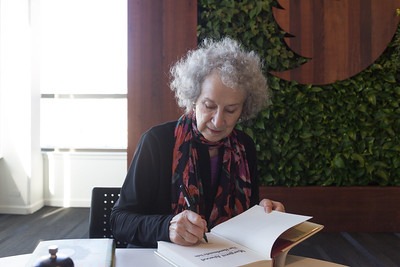Margaret Atwood: A literary luminary and social critic
On June 24 2022, the US Supreme Court overturned the 1973 Roe v Wade ruling which had granted women the right to an abortion up until the point of foetal viability. Millions of women across the country lost their right to abortion and their bodily autonomy; women travelled further across the country for an abortion and some were forced to carry them out in unsafe, unsanitary conditions without the presence of a medical professional. This horrifically dystopian government ruling sparked worldwide outrage, baring a striking resemblance to Margaret Atwood’s widely acclaimed and honoured novel, The Handmaid’s Tale. The novel is set in a futuristic, patriarchal, totalitarian state known as the Republic of Gilead in which ‘Handmaids’ are forcibly assigned to ‘Commanders’ to produce children for them. Despite being published in 1985, Atwood’s world of Gilead transcends her time as issues of loss of female reproductive rights and agency are all too common in our world today. Atwood, in response to her apparent ability to predict worldwide societal debates, likes to say, “I just pay attention”, so what can we learn from Atwood’s work, both in the literary and real world?
At the age of 84, Atwood is as outspoken as ever, not allowing her newly fitted pacemaker or passing of her lifelong partner deter her from continuing to produce moving pieces of literature and poetry. In a recent interview, Atwood discussed the constant debate regarding censorship in education and how often books and sources are banned from being taught in schools due to their ‘offensive’ nature. Atwood is not a stranger to this topic, for her work centres on the dangers of ideology and sexual politics, deconstructing myths and societal norms, and issues that are often censored and limited in content in US schools.
“In Atwood’s eyes, questions of freedom of expression and democracy are front and centre right now, with all sides of politics turning to censorship”
In Atwood’s eyes, questions of freedom of expression and democracy are front and centre right now, with all sides of politics turning to censorship. The dangers of this are immeasurable, for education of future generations focusing on pleasant, ‘easy’ topics not only limits their education of the reality they live in, but also prohibits them from making positive change for their future.
I was first introduced to Atwood’s work in secondary school, as most young people are – having a strong interest in Greek mythology, I read her reimagining of the Epic classic, The Odyssey. The Penelopiad is told from the perspective of Greek hero, Odysseus’ wife, Penelope, from beyond the grave. I was immediately gripped by her stark, uncensored form of writing as she deconstructed common myths surrounding Greek heroes and shed a feminist light on the untold stories of Greek women. Despite her work being fictional, Atwood’s work is vital in our understanding of the past and the future – her ability to observe mistakes in human history and express them in literature is an essential lesson to us all, for it is how we prohibit them from happening in the future.
“It would be an understatement to acknowledge the impact Atwood has had on the literary world: her work was the first of its kind and continues to inspire further literature and film, and more”
It would be an understatement to acknowledge the impact Atwood has had on the literary world: her work was the first of its kind and continues to inspire further literature and film, and more. Not only this, she inspires beyond the literary world with her unique perspectives on life and experience. When she was a teenager, Atwood wrote a story about a 40-year-old woman, who was “dusty and used up and without hope and covered with cobwebs”, however at now over double that age, Atwood shines brighter than ever and continues to unapologetically spill her soul and light into her work. There are countless lessons to be learned from Atwood: age is but a number, do not let it limit your creativity and spark; seek the truth! Do not allow censorship to hinder your education and awareness of the world: stay vigilant and courageous, and be wary of the future for it is not pre-determined and anything can happen.

Comments (1)
So insightful and so important to make these links because life and politics feel so dystopian at points. Such a great article!